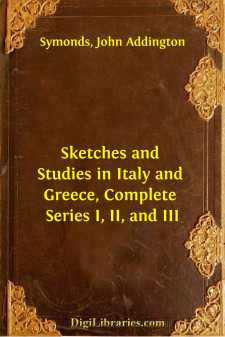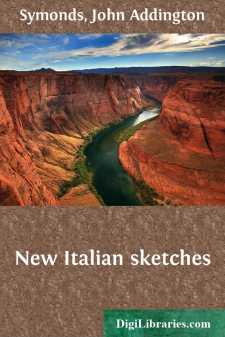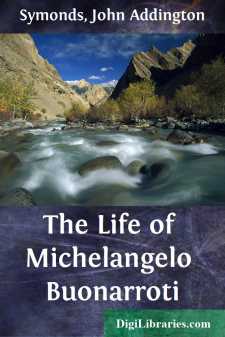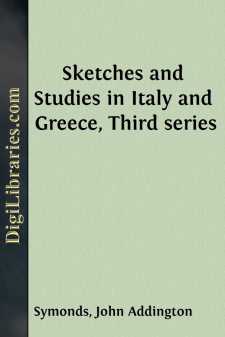Categories
- Antiques & Collectibles 13
- Architecture 36
- Art 48
- Bibles 22
- Biography & Autobiography 813
- Body, Mind & Spirit 142
- Business & Economics 28
- Children's Books 17
- Children's Fiction 14
- Computers 4
- Cooking 94
- Crafts & Hobbies 4
- Drama 346
- Education 46
- Family & Relationships 57
- Fiction 11829
- Games 19
- Gardening 17
- Health & Fitness 34
- History 1377
- House & Home 1
- Humor 147
- Juvenile Fiction 1873
- Juvenile Nonfiction 202
- Language Arts & Disciplines 88
- Law 16
- Literary Collections 686
- Literary Criticism 179
- Mathematics 13
- Medical 41
- Music 40
- Nature 179
- Non-Classifiable 1768
- Performing Arts 7
- Periodicals 1453
- Philosophy 64
- Photography 2
- Poetry 896
- Political Science 203
- Psychology 42
- Reference 154
- Religion 513
- Science 126
- Self-Help 84
- Social Science 81
- Sports & Recreation 34
- Study Aids 3
- Technology & Engineering 59
- Transportation 23
- Travel 463
- True Crime 29
Sketches and Studies in Italy and Greece, Complete Series I, II, and III
Description:
Excerpt
Of all the joys in life, none is greater than the joy of arriving on the outskirts of Switzerland at the end of a long dusty day's journey from Paris. The true epicure in refined pleasures will never travel to Basle by night. He courts the heat of the sun and the monotony of French plains,—their sluggish streams and never-ending poplar trees—for the sake of the evening coolness and the gradual approach to the great Alps, which await him at the close of the day. It is about Mulhausen that he begins to feel a change in the landscape. The fields broaden into rolling downs, watered by clear and running streams; the green Swiss thistle grows by riverside and cowshed; pines begin to tuft the slopes of gently rising hills; and now the sun has set, the stars come out, first Hesper, then the troop of lesser lights; and he feels—yes, indeed, there is now no mistake—the well-known, well-loved magical fresh air, that never fails to blow from snowy mountains and meadows watered by perennial streams. The last hour is one of exquisite enjoyment, and when he reaches Basle, he scarcely sleeps all night for hearing the swift Rhine beneath the balconies, and knowing that the moon is shining on its waters, through the town, beneath the bridges, between pasture-lands and copses, up the still mountain-girdled valleys to the ice-caves where the water springs. There is nothing in all experience of travelling like this. We may greet the Mediterranean at Marseilles with enthusiasm; on entering Rome by the Porta del Popolo, we may reflect with pride that we have reached the goal of our pilgrimage, and are at last among world-shaking memories. But neither Rome nor the Riviera wins our hearts like Switzerland. We do not lie awake in London thinking of them; we do not long so intensely, as the year comes round, to revisit them. Our affection is less a passion than that which we cherish for Switzerland.
Why, then, is this? What, after all, is the love of the Alps, and when and where did it begin? It is easier to ask these questions than to answer them. The classic nations hated mountains. Greek and Roman poets talk of them with disgust and dread. Nothing could have been more depressing to a courtier of Augustus than residence at Aosta, even though he found his theatres and triumphal arches there. Wherever classical feeling has predominated, this has been the case. Cellini's Memoirs, written in the height of pagan Renaissance, well express the aversion which a Florentine or Roman felt for the inhospitable wildernesses of Switzerland. Dryden, in his dedication to 'The Indian Emperor,' says, 'High objects, it is true, attract the sight; but it looks up with pain on craggy rocks and barren mountains, and continues not intent on any object which is wanting in shades and green to entertain it.' Addison and Gray had no better epithets than 'rugged,' 'horrid,' and the like for Alpine landscape. The classic spirit was adverse to enthusiasm for mere nature. Humanity was too prominent, and city life absorbed all interests,—not to speak of what perhaps is the weightiest reason—that solitude, indifferent accommodation, and imperfect means of travelling, rendered mountainous countries peculiarly disagreeable. It is impossible to enjoy art or nature while suffering from fatigue and cold, dreading the attacks of robbers, and wondering whether you will find food and shelter at the end of your day's journey. Nor was it different in the Middle Ages. Then individuals had either no leisure from war or strife with the elements, or else they devoted themselves to the salvation of their souls. But when the ideas of the Middle Ages had decayed, when improved arts of life had freed men from servile subjection to daily needs, when the bondage of religious tyranny had been thrown off and political liberty allowed the full development of tastes and instincts, when, moreover, the classical traditions had lost their power, and courts and coteries became too narrow for the activity of man,—then suddenly it was discovered that Nature in herself possessed transcendent charms. It may seem absurd to class them all together; yet there is no doubt that the French Revolution, the criticism of the Bible, Pantheistic forms of religious feeling, landscape-painting, Alpine travelling, and the poetry of Nature, are all signs of the same movement—of a new Renaissance. Limitations of every sort have been shaken off during the last century; all forms have been destroyed, all questions asked. The classical spirit loved to arrange, model, preserve traditions, obey laws. We are intolerant of everything that is not simple, unbiassed by prescription, liberal as the wind, and natural as the mountain crags. We go to feed this spirit of freedom among the Alps. What the virgin forests of America are to the Americans, the Alps are to us. What there is in these huge blocks and walls of granite crowned with ice that fascinates us, it is hard to analyse....












